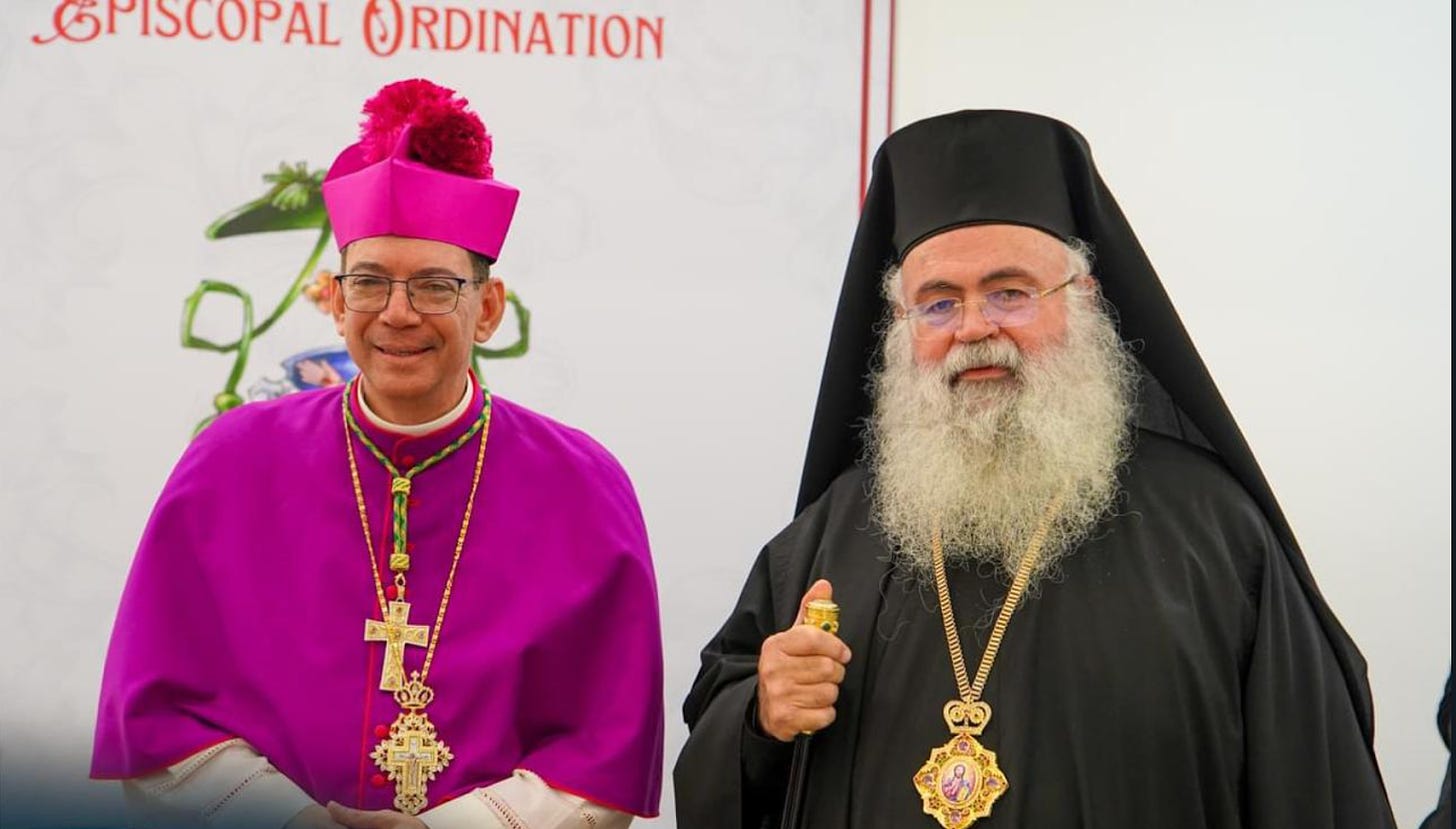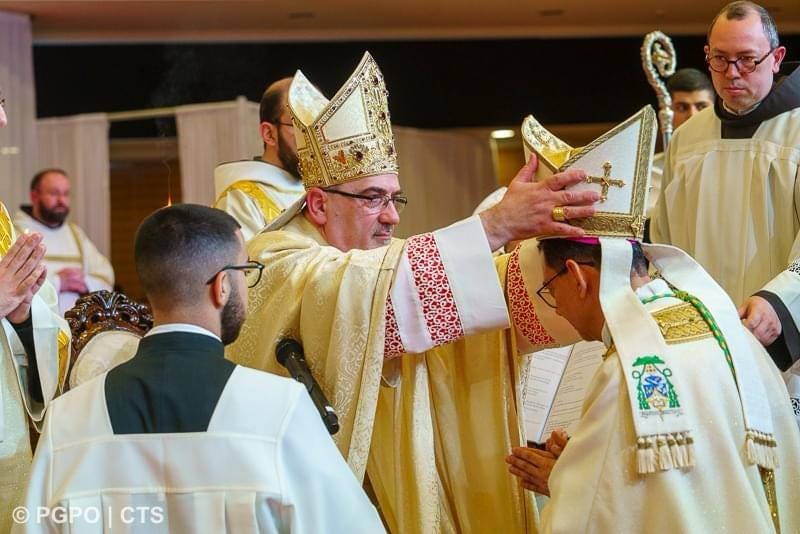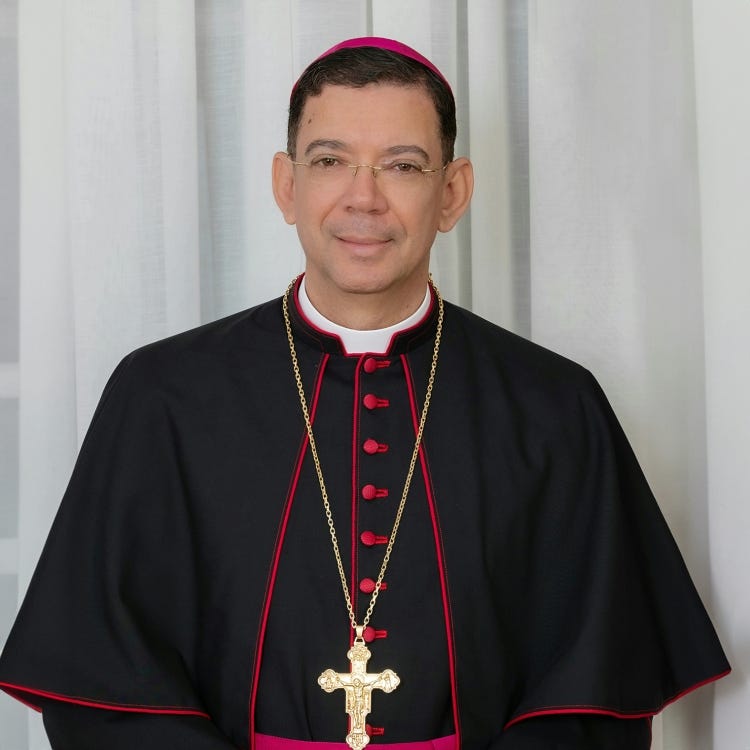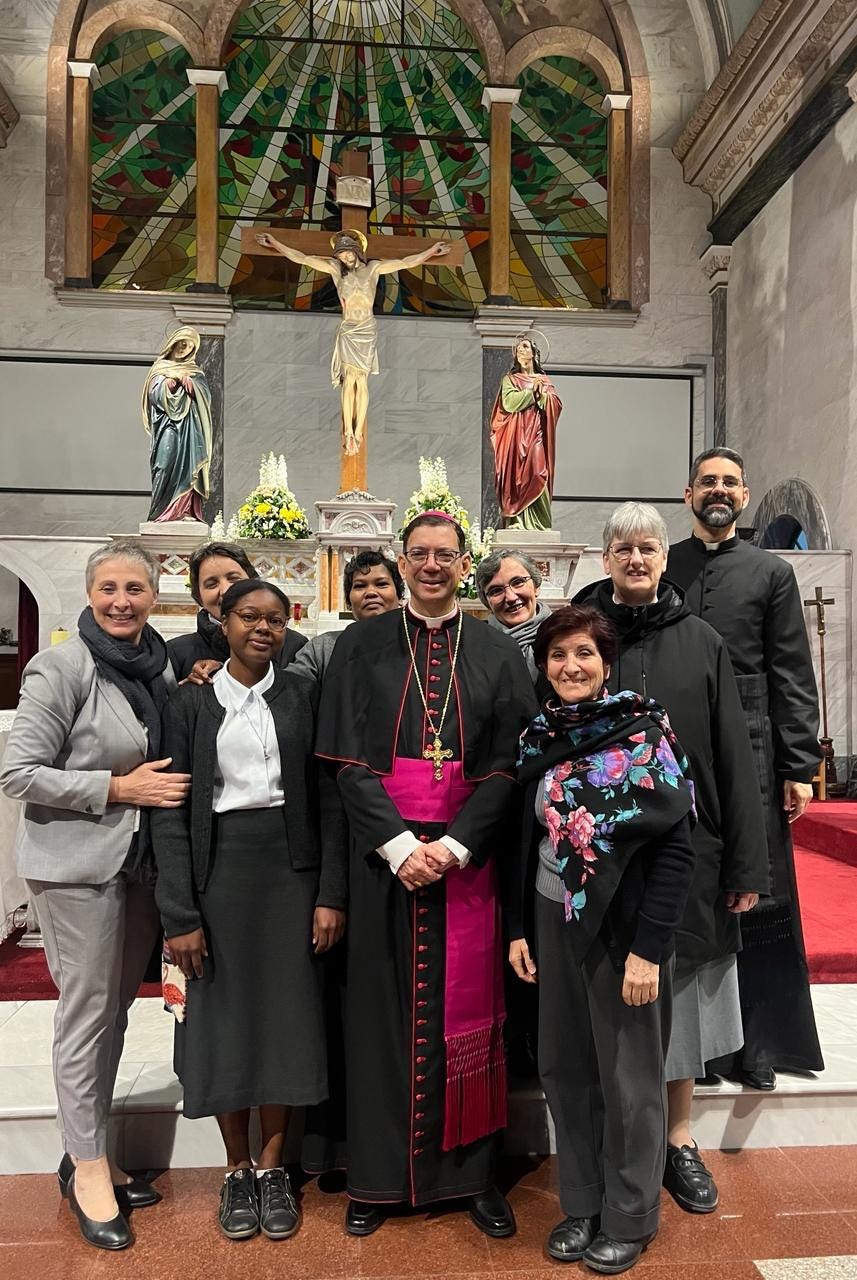On March 16, Bruno Varriano, OFM was ordained an auxiliary bishop of the Latin Patriarchate of Jerusalem by Cardinal Pierbattista Pizzaballa.
Varriano was born in Brazil but raised in Italy and is an Italian citizen. He lived there before joining the Franciscan order and then the Custody of the Holy Land in 2002. He would mostly live in the Holy Land until 2022 when he was appointed as the Patriarchal Vicar for Cyprus, a small island near the Turkish Mediterranean coast.
Cyprus is under the pastoral care of the Latin Patriarchate of Jerusalem. So when Bishop Varriano was ordained, he became the first resident Latin bishop in Cyprus since the Venetians left the island 340 years ago.
Cyprus is a traditionally Orthodox country but retains two small Catholic minorities - one Maronite and one Latin - that make up about 3% of the island’s population. The Latin community has grown in the last few years thanks to migration, which made the need for a resident bishop ever more urgent.
One unique aspect of the island is that a third of it is occupied by the Turkish Republic of Northern Cyprus, a state that is only recognized by Turkey. That side of the island, majority Muslim, also has a Catholic minority.
Bishop Varriano spoke with The Pillar about the unique challenges of the Cypriot Church, ecumenism in Cyprus, the division of the island, and the role of the Church in the war in the Middle East.
The interview has been edited for length and clarity.
You were already the patriarchal vicar in Cyprus. Why were you appointed bishop? What does your presence as a Latin bishop on the island represent?
I am the first Latin Catholic bishop after 340 years without a Latin bishop. Cyprus' history is very complex because it is the gateway to the East. It has also been under different rulers, which complicates things. One of the powers that passed through Cyprus was the Venetians, who brought the Latin Church, almost as an imposition, to Cyprus.
That's why the Catholic Church has to be open to dialogue, and it has never tried to infringe on the fact that the identity of Cyprus is linked to the Orthodox Church.
The Latin Catholic Church, composed of actual Cypriots who have retained their Catholic faith, is small, but one that is very well respected. We even have a representative in parliament, currently, Antonella Mantovani, who represents this small community of Latin Catholics who have continued to live in Cyprus, who form a significant community, but always show great humility and great delicacy towards the Orthodox.
Here in Cyprus, you have the largest religious community, which is the Orthodox, but within the Constitution, there is a recognition for three minorities: the Armenian Orthodox, Maronite Catholics, and Latin Catholics. These are the three minorities that Cyprus recognizes, protects, and provides with representatives in parliament to bring the voice of these three communities at the political level.
Their representatives are elected by the community. When there are parliamentary elections, there are special lists for different communities. For example, if you're registered as a Latin Catholic, you get the opportunity to elect a Latin Catholic for parliament, aside from the normal parliamentarians.
The Latin Catholic community is growing every day because there are a large number of Catholic immigrants: Filipinos, Indians, Congolese, Nigerians, Italians, English and Irish who stayed here because Cyprus was an English colony. So, there has been a great growth in this Latin Catholic Church, which also coexists with the other Catholic communities, which are the Maronite Catholic Church and now Ukrainian Greek Catholics whose numbers have grown since the war, and we have a Ukrainian priest to serve them.
That's why Pope Francis, when he visited Cyprus in 2021, asked why there was no Latin Catholic bishop here. And the Patriarch of Jerusalem, with a lot of pastoral sensibility for Cyprus, saw that it was the right time, an idea he matured by listening to the Orthodox and having a lot of respect for them.
The idea was to have a new Latin bishop who wasn't someone imposed by an outside force, like the Venetians, but was a priest who already lived here. I already lived here in Cyprus. I was already here with them. The bishops already knew me because I was already working as the patriarchal vicar for Cyprus.
So, the decision was welcomed by everyone. It was so well received that the Orthodox archbishop, Georgios II, was present at my ordination here in Cyprus six months ago, and took part in the celebrations, together with Porphyrios, the Orthodox metropolitan, and all the other religious leaders. So I was really welcomed by the whole community in Cyprus.
What is Catholicism like in Cyprus? What is the Church's evangelization and work like in the country?
The Catholic Church has the richness of having two branches here in Cyprus: the Latin Catholic Church and the Maronite Church. The Maronite Church already has a very solid organization with parishes, with a social presence that is very much part of the community, they are very present in political life. We, Latin Catholics have now resumed our presence in Cyprus, where we have four parishes, but with many other communities to attend to and to be established. So, today we have my confreres, the Franciscan friars. We have the priests of the Incarnate Word and seven diocesan priests who are already working in Cyprus. So, we have 18 priests working on the island.
This is very interesting because I'm bringing in fidei donum priests from abroad. We’re starting in every sense. There are many devotional groups, but now we are starting with pastoral work: the diocesan catechetical commission, the pastoral care of refugees, the pastoral care of the sick, interreligious dialogue, justice and peace, other diocesan commissions, and also the ecclesiastical tribunal. For the first time, the Latin Church will have its ecclesiastical tribunal in Cyprus. So that's more or less the general picture.
We have religious sisters, we have the Franciscan Sisters of the Sacred Heart, who are present on the island. The Sisters of St. Joseph of the Apparition, and the Sisters of Perpetual Help, who are from Sri Lanka. We are starting the consecrated virgins, who are the presence of consecrated lay people, and I also have three candidates for the permanent diaconate.
The Maronite Church has Cypriot priests, and we hope to have Cypriot priests in the Latin Catholic Church in the future. We don't have any seminarians at the moment, but we do have young Cypriots in discernment. We can't be in a hurry to send them, but we have young people in discernment. That's the first step.
I am very enthusiastic about this work, we are now opening the Saint Barnaba Training Center with the first theology courses for laypeople, and it will also be open to Greek Orthodox, Armenians, Anglicans, and other non-Catholics.
The Christian presence is very rich. We are trying our best to do our pastoral labor in dialogue with the churches that are already present in the country.
We can't forget Cyprus' complexity. More than a third of the island is occupied by Turkey, and people can't move [from one side to the other]. It's very difficult. I can get through because I have a diplomatic passport, and we have eight Catholic communities on the other side, four Maronite and four Latin Catholic, going through a lot of difficulties.
I currently have two priests living there. Soon, I'm going to hold a meeting with the clergy. And I'm asking for permission to hold the clergy meeting in the Buffer Zone, which is neutral so that the two priests who are in the North can take part in the meeting.
This gives you an idea of the complexity. But it's a very lively Church, very full of energy, projects, and future.
How does the secularization observed throughout Europe affect countries like Cyprus, which is seen as a bridge between East and West?
It's visible because we're in the southern part, which is European.
The north of Cyprus, which is the territory occupied by Turkey, it’s not Europe, and is not part of the Republic of Cyprus. The money that circulates is Turkish, the language that is spoken is Turkish, and the majority of the population is Muslim, it’s a totally different reality.
The north is not part of the European continent. It's an occupation within the island. There is a so-called Republic of North Cyprus, but it is not recognized by the international community. No other countries have an embassy in the north. It's recognized by Turkey alone.
It's very sensitive for them because they're not in the European Union; it's Turkey's wish to be in the European Union, but they're not part of it. For example, Turks need a visa to travel to Cyprus. Turks can't go to the southern part, but Turkish Cypriots can. Turkish Cypriots can travel to the south because they have a Cypriot identity card.
Going back to your question, in the south, all Christians, the Orthodox Church, the Armenian Church, the Latin Catholic Church, and the Maronite Church, have to be very united on fundamental issues, such as gender ideology in schools.
There is always this pressure in Cyprus, but we are very united as bishops, we are united with our Orthodox bishop, who has a very clear idea on these issues, and we also suffer together from the large number of refugees who arrive in the south, who find themselves in a trap, because they get to this island thinking they have arrived in [mainland] Europe, but they have not arrived in Europe.
So we also have difficulties with immigration, not the organized kind that is necessary, because Cyprus needs the presence of others who are not Cypriots, but of refugees who arrive in large numbers here in Cyprus.
How are relations with the local Orthodox Church?
The major archbishop, Giorgios II, told me once, “I recognize you as a bishop, I recognize your episcopate as I recognize the bishop of Rome.”
This is very important in the [ecumenical] dialogue because it is recognized by the Orthodox Church with a lot of affection. For example, he often receives me in his office, and the Orthodox bishops come to my house to have lunch, to share moments of fraternity. They were all present at my episcopal ordination. There is a very open relationship and dialogue, and a lot of work with refugees. I work in the Pournara refugee camp. Every week we have a Catholic presence.
We have dialogue and a common concern, which is the faith, which is the good of the faithful. I can say that the Republic of Cyprus has great respect for the Latin Catholic Church and the Maronite Catholic Church. We are experiencing a moment of respect, dialogue, listening, and also of assistance.

How are relations between the Latin and Maronite communities?
The Maronites have a Catholic archbishop who is a great friend. We are two brothers, we meet weekly, often more than that, and we talk a lot. They say here in Cyprus that Bishop Selim and Bishop Bruno Varriano are two brothers who walk together. This is the greatest witness we are giving, and we want to do it with the Orthodox Church, because I think that the first witness to unity: unity between the bishops and priests of the Church. Then we can give a sign of unity to the island.
Would you say that Cyprus is a model for relations with the Orthodox for the rest of the world?
I think so. I think that the Church of Cyprus can be a model for dialogue.
We have some internal difficulties. For example, some Orthodox bishops don't fully agree with the archbishop on this point, but these are personal issues that I think can always be resolved with friendship, with a visit, with personal relationships. But as a whole, the Church of Cyprus is an example.
So just to give you an idea, in the city of Paphos, the parish functions in an Orthodox church and in the city of Paralimni, we have the church of St. Cornelius, also given to us by the Orthodox for our Sunday Masses. In Ayia Napa, we have another Orthodox church which was also given to us for Sunday celebrations. So I think it's a concrete sign of welcome and also of friendship, it's a really extraordinary sign.
In the homily at your consecration, Cardinal Pizzaballa said something very interesting: “The decision to have a Latin bishop in Cyprus and the spirit that will accompany him will therefore not be one of restoration but of service.” What did he mean by that?
The image of my predecessors, the bishops who were here in the Latin Church at the time of the Venetians, was really an image of power. And today we are here not for power. The Latin Church is the Church of service, so much so that the meaning of having a Latin bishop is that he should be the first servant of all. The Holy Father, in the bull of my appointment, emphasized this aspect of the shepherd. He is with the sheep in times of difficulty, and the sheep follow the shepherd in those times.
For this reason, the Latin bishop is characterized by episcopal service, not by temporal power, but by service to the Church and service to society, because we have to concern ourselves with the social issues of Cyprus, such as immigration, refugees and job difficulties. That's why the Church is inserted into the social world. Always with this sense of service first.
What are the main pastoral challenges for the Catholic Church in Cyprus?
The first challenge is to unite the Latin community, which is very diverse. I am paying special attention to our Cypriot Latin Catholics, of whom many are now married to Orthodox spouses. I'm trying my best to enhance the Eucharist celebrated in Greek so as not to lose this small community of Cypriot Latins who are Cypriot citizens who were born and raised here, and are the oldest members of our flock.
This is a big challenge because we have a very lively church of Filipinos, Indians, and also English, Irish, and Italians. We manage to be all together, but we need to recover this Greek-speaking Latin community,
This country is wounded by divisions, it's a wounded country. Cyprus is wounded by the occupation, by having the city of Nicosia divided, with a checkpoint that separates the island, which is sad because it is a uniquely beautiful island!
People feel this division and they carry it in their hearts, this pain, this pity. This is also reflected in our communities, where people are easily divided.
They don't have harmony, so my great challenge as pastor is for everyone to go throughout the island, whether in the north or the south, and be that father of the community, to unite them. That's a big challenge.
Another challenge is the north, the channel of dialogue with them, and the difficulty of using our temples there. They don't accept us using our temples. We are allowed only to use a small church in Kyrenia in the north. We celebrate Masses in rented parking lots that are organized as if they were churches.
The Maronites have an even bigger problem: the Maronite Catholics still have small villages like Karpasia, and Agia Marina, where the priests have difficulties entering these Maronite villages. That's the great difficulty, we have to cross over to the other side and serve these eight communities we have in the north, four Latin and four Maronite.
How is the Church in Cyprus affected by the increasingly complicated situation in the Middle East?
We are affected with our hearts, with our bodies, and with our minds. We are connected to the mother Church in Jerusalem. That's why I've also called for the entire Latin community in Cyprus to do penance and pray the rosary for peace on the day of Our Lady of the Rosary, on October 7.
We are totally united and we see the consequences because refugees are arriving from Gaza. Palestinians are arriving here in Cyprus and we are experiencing this pain because we are one hour from Jerusalem by plane. We are very close and we feel the sadness of the war.
That's why we are very affected. Our community breathes with the lungs of the East because we are the gateway to the East and the Latin Catholic Church even more so because we have our patriarch, Cardinal Pizzaballa, in Jerusalem, so our entire Catholic community is linked to Jerusalem.

You lived in the Holy Land for many years, what do you think the role of the Church should be in this complex situation?
Always remembering that the Church has children who suffer. The Church in Jerusalem has its children who are suffering in Gaza, in Samaria, in Nablus, and in Ramallah, who suffer in the Palestinian territory, in Bethlehem. We have Latin Catholics in all these places.
That's why the patriarch's attitude is that of a father who sees the suffering of his children in the Church, just as I do as a bishop. I am here suffering for what is happening.
We should also not forget that we also have Catholics in the Israeli army. We must never forget that we have a Hebrew-speaking Catholic community. Today we have a vicar, Father Piotr Zelasko, a Polish priest, who is the patriarchal vicar for the Jewish community. And our young men also go into the army. That's why we really have to ask for the gift of peace, because this war is bad for everyone.
That's why it's time for the whole Church not to talk so much about politics, but to pray for peace, not to force its opinion on either side, but to bring the different parties together, even at the sacrifice of itself, because when you take a stand, you are often neither understood by one side nor the other, because you are with your whole being with those who are suffering on both sides.
That's why we're agents of peace. Today we are often attacked, but the Church does not forget that it is called to be a gift of peace, not of compromise, but of a sign of peace and justice.
So you don't think that the Church could or should take on a more active role of mediator or negotiator in the crisis?
I don't think there's an organization that is taking a more concrete mediation action than the Latin Catholic Church. We are totally inserted in the context. For example, the Catholic community in Gaza brings together all the Christians around it. Our patriarch is the one who intercedes for water to enter, for food to enter, and is the first to offer himself to dialogue due to his love for the two peoples.
However, with an attitude of really putting a cara e a coragem (the face and the courage), as we say in Brazil. Our patriarch puts all of himself, and all of us bishops together with him, all the priests, because we can’t be indifferent and leave our people behind. That's why the patriarch is present.
Beyond that, I don't see what else the Church can do. People have no idea how much aid gets in because of the Church. The Holy Father calls the parish priest in Gaza every day. Pope Francis speaks to them every day. The patriarch also talks with them every day and when he goes there, he risks himself. He goes in and is with the community, denouncing what is happening and remembering the suffering of our people.
I am even moved to see how much our patriarch really is a shepherd who is not afraid of anything. But always remembering that the Church is a sign of peace for the two peoples, so that these two peoples that we love can truly live in peace.
How can the Church deal with such a precarious political humanitarian situation, which even in times of peace is in constant tension?
By getting fully involved. Not by discussing politics, but by concrete Christian action, which is often confused with politics. Concrete Christian action is being in the environment.
For example, the Catholic Church has not abandoned its faithful at home. The Catholic church has electricity for 2 hours a day, and the priests are there. The Catholic Church sees the needs of families and seeks concrete help.
Thanks be to God and to the Christians of the world, who are helping us to bring in water, to bring in food, and to provide channels for dialogue to reduce the bombings and what is happening, which is why the Church is there. This concrete action can be confused with politics, but no. The Church is present, and always was before the war, and now and always will be there.
The Church does not abandon. We also see signs of this in Syria, where the Franciscans haven't abandoned the villages - it's a characteristic of the Church that it doesn't abandon the people. It is in the middle, with all the consequences, and I think that history will show how deeply the Catholic Church was involved in what is happening in the Middle East, not with a policy of partisanship, but with a policy of concrete action for those who are suffering.






